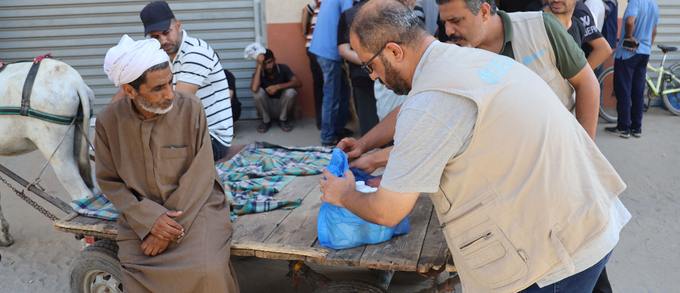June 16, 2025 | 04:16 GMT +7
June 16, 2025 | 04:16 GMT +7
Hotline: 0913.378.918
June 16, 2025 | 04:16 GMT +7
Hotline: 0913.378.918

FAO delivers first set of veterinary kits to 2 452 households in Gaza to support livestock health and combat acute food insecurity. Photo: FAO/Yousef Alrozzi.
The near ten-month conflict has caused the collapse of local food production and agrifood value chains, contributing to the rapid deterioration of food security in Gaza, with 96 percent of the population or 2.15 million people facing high levels of acute food insecurity and a looming risk of famine.
Following the successful delivery of 500 tonnes of fodder to Gaza, this FAO shipment of veterinary kits is the first to enter the Strip since the escalation of hostilities began. FAO is also the first agency to pilot these kits from the West Bank into Gaza. The veterinary kits include critically needed inputs to safeguard animals, such as multivitamins, disinfectants, salt blocks and iodine wound spray.
About 70 percent of meat and dairy-producing livestock in Gaza have been slaughtered, consumed or lost due to the ongoing hostilities. Bilal from Rafah, a livestock keeper and an FAO beneficiary, has expressed that these inputs are not available locally but are a lifeline for their animals' health. Bilal explains: "Honestly, the support our animals need is fodder. That’s the most important thing for us, along with medicines and vaccines."
“The lack of essential veterinary materials in the Strip impacts animal health and welfare and prevents livestock holders from providing decent care to them. We believe that providing these inputs is essential to support the local communities and their animals, ensuring both immediate care and long-term protection during this conflict. It is crucial to focus our efforts on keeping livestock alive and healthy, which means ensuring access to protein and milk for families and particularly for children who are malnourished or at risk of malnourishment,” stated Azzam Saleh, Head of Programme of FAO West Bank and Gaza Strip.
"Immediate investment is crucial to ensure the protection of remaining livestock and farms and the rapid recovery of the damaged agriculture and food system infrastructure caused by the conflict. The functionality and restoration of the local food system is crucial to minimize the concerning levels of acute food insecurity and malnutrition across the Gaza Strip, which remains difficult without an immediate ceasefire and a vast acceleration of humanitarian aid," said Abdulhakim Elwaer, FAO Assistant Director-General and Regional Representative for the Near East and North Africa.
FAO, supported by the governments of Belgium, Italy and Norway, is working closely with the Palestinian Ministry of Agriculture and local non-governmental organizations to distribute these veterinary kits to the livestock holders in Gaza. Elwaer stressed that “the supply of vaccines not only ensured animal health but further strengths the one health aspect and eliminates the risk of spread of transmittable diseases from animals to humans.”
Under the 2024 UN Flash Appeal for the occupied Palestinian territory, FAO currently appeals for around $40 million, comprising $29 million for Gaza and $11 million for the West Bank, to meet the needs of 70 660 individuals through: (i) distributing animal fodder and health inputs in the Gaza Strip, (ii) restocking lost livestock in Gaza, (iii) providing time-critical inputs to farmers in Gaza, and (iv) offering emergency assistance to vulnerable farmers and livestock holders impacted by heightened violence and movement constraints in the West Bank.
Moreover, a new shipment of 500 tonnes of fodder is under preparation to be sent to Gaza. Of these, three trucks have already entered Gaza, and their distribution has reached 217 beneficiaries, who received a total of 651 barley sacks. The 500 tonnes of fodder will be delivered to over 4 000 herders across the Strip with the support of local partners that are on the ground. The initial 500 tonnes of animal fodder delivered by FAO has reached over 3 100 livestock keepers in the Strip.
While food aid is indispensable, it is not sufficient to meet caloric and nutritional needs in Gaza. Before the conflict, fodder was the most important pre-war import in Gaza, with almost 650 trucks entering the Strip with fodder every month before 7 October. FAO supports vulnerable farmers and herders in Gaza to safeguard surviving animals and resume local food production of fresh, perishable but nutritious food like milk, eggs, red meat and vegetables. These foods are crucial for a healthy diet, particularly for children.
(FAO)

(VAN) Extensive licensing requirements raise concerns about intellectual property theft.

(VAN) As of Friday, a salmonella outbreak linked to a California egg producer had sickened at least 79 people. Of the infected people, 21 hospitalizations were reported, U.S. health officials said.

(VAN) With the war ongoing, many Ukrainian farmers and rural farming families face limited access to their land due to mines and lack the financial resources to purchase needed agricultural inputs.

(VAN) Vikas Rambal has quietly built a $5 billion business empire in manufacturing, property and solar, and catapulted onto the Rich List.

(VAN) Available cropland now at less than five percent, according to latest geospatial assessment from FAO and UNOSAT.

(VAN) Alt Carbon has raised $12 million in a seed round as it plans to scale its carbon dioxide removal work in the South Asian nation.

(VAN) Attempts to bring down the price of the Japanese staple have had little effect amid a cost-of-living crisis.